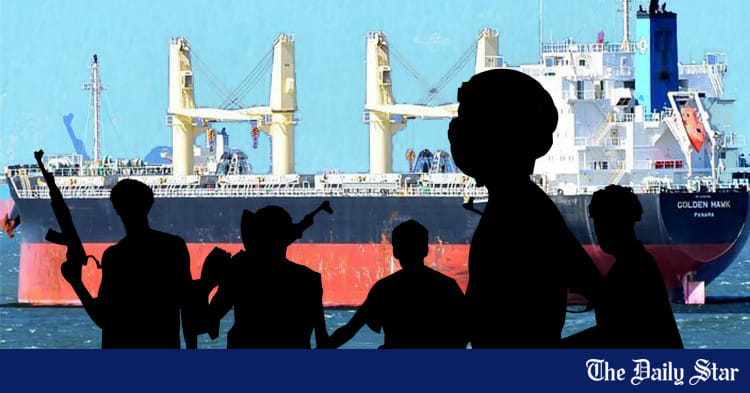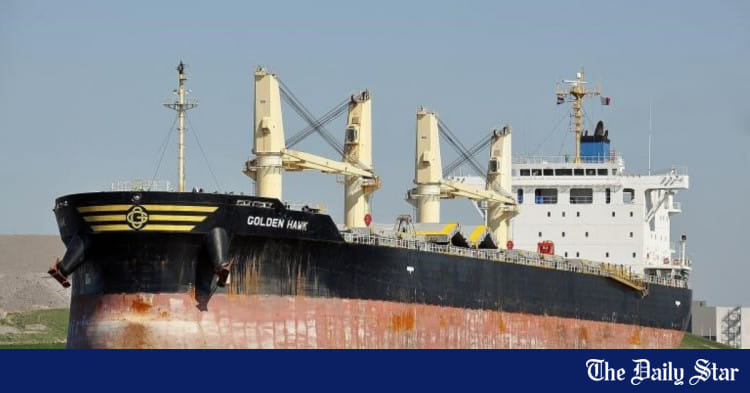Saif
Senior Member
- Messages
- 15,397
- Nation

- Axis Group

We need a powerful Ocean going navy to protect our merchant ships from sea pirates in the Indian Ocean and Arabian Sea.


Hijacked Bangladeshi ship: Pirates demand $5 million as ransom
Breaking News, International News & Multimedia
thedailynewnation.com
Hijacked Bangladeshi ship: Pirates demand $5 million as ransom
14 Mar 2024, 12:00 am

Special Correspondent :
The government of Bangladesh has reported that the 23 crews of MV Abdullah, currently held hostage by Somali pirates, are safe, and concerted efforts are underway to secure their release.
Negotiations are actively taking place between relevant departments and the pirates, reminiscent of the successful liberation of Bangladeshi crews from Somali captivity back in 2010.
According to sources within the Foreign Ministry and Shipping Ministry, the government is closely monitoring the situation, with the ship still within its surveillance radar as the pirates gradually steer it towards Somalia.
Despite the gravity of the situation, some crew members have managed to establish contact with their families, urging them to facilitate their rescue from the clutches of the pirates, who are reportedly demanding a ransom of around $5 million.
“We have initiated communication with the pirates through intermediaries.
There are various agencies experienced in negotiating with Somali pirates, including those who were involved in the successful rescue mission in 2010,” disclosed a senior official from the Department of Shipping (DoS), speaking on condition of anonymity.
Some family members of the abducted crew have taken the initiative to reach out to the owner of the ship, the KSRM Group in Chattogram, hoping to contribute to the efforts for their release.
Among the 23 crew members, 11 hail from Chattogram alone, two are from Noakhali, and one each from Natore, Naogaon, Feni, Faridpur, Lakshmipur, Barishal, Netrakona, Sirajganj, Tangail, and Khulna.
As of now, the government of Bangladesh has not disclosed any details regarding the ransom demanded by the pirates.
Khalid Mahmud, the State Minister for Shipping, assured reporters at the Secretariat on Wednesday that intensive efforts are underway to secure the release of the MV Abdullah’s crew.
However, Mahmud acknowledged the complexity of the situation, stating that the captors are not ordinary individuals but pirates.
He highlighted that certain organisations are equipped to negotiate with the pirates and emphasised the government’s commitment to ensuring the swift and safe return of both the crew and the vessel.
Regarding the location of the ship, Mahmud mentioned that it is currently positioned approximately 600 nautical miles off the Somali coast. While the exact identity of the pirates remains unknown, he indicated that they are likely from the region.
Mahmud reiterated the government’s unwavering determination to repatriate the crew without compromising their safety.
Despite concerns about potential threats to the crew’s lives, Mahmud stated that there has been no official indication of such risks, emphasising the government’s priority to bring the crew back home unharmed.
Prime Minister Sheikh Hasina has issued directives to the Foreign Ministry and other relevant authorities to ensure the safe return of the crew members of the hijacked ship.
The vessel, owned by SR Shipping, a company under the KSRM Group based in Chattogram, fell prey to Somali pirates in the Indian Ocean while en route from Mozambique to Dubai. All 23 crew members aboard the ship are Bangladeshi nationals.
Shahriar Jahan Rahat, Deputy Managing Director of KSRM Group, assured the media that the company is prioritizing the rescue efforts for the 23 crew members. The crew roster includes Captain Mohammad Abdur Rashid, Chief Officer Mohammad Atikullah Khan, Second Officer Mazharul Islam Chowdhury, Third Officer Tarequl Islam, Deck Cadet Sabbir Hossain, Chief Engineer ASM Saiduzzaman, Second Officer Toufiqul Islam, Third Engineer Rokon Uddin, Fourth Engineer Tanvir Ahmed, Engine Cadet Ayub Khan, electrician Ibrahim Khalil, seaman Md Anwarul Haque, seaman Md Asifur Rahman, seaman Sazzad Hossain, seaman Joy Mahmud, seaman Nazmul Haque, seaman Ainul Haque, oiler Mohammad Shamsuddin, Ali Hossain, fireman Mosharraf Hossain Shakil, chief cook Shafiqul Islam, general steward Nur Uddin, and fitter Saleh Ahmed.
Notably, KSRM Group owns a fleet of 23 ships, all engaged in international routes. In a similar incident in 2010, one of their vessels, ‘MV Zahan Moni,’ was hijacked by Somali pirates but later released after a ransom was provided.
14 Mar 2024, 12:00 am
Special Correspondent :
The government of Bangladesh has reported that the 23 crews of MV Abdullah, currently held hostage by Somali pirates, are safe, and concerted efforts are underway to secure their release.
Negotiations are actively taking place between relevant departments and the pirates, reminiscent of the successful liberation of Bangladeshi crews from Somali captivity back in 2010.
According to sources within the Foreign Ministry and Shipping Ministry, the government is closely monitoring the situation, with the ship still within its surveillance radar as the pirates gradually steer it towards Somalia.
Despite the gravity of the situation, some crew members have managed to establish contact with their families, urging them to facilitate their rescue from the clutches of the pirates, who are reportedly demanding a ransom of around $5 million.
“We have initiated communication with the pirates through intermediaries.
There are various agencies experienced in negotiating with Somali pirates, including those who were involved in the successful rescue mission in 2010,” disclosed a senior official from the Department of Shipping (DoS), speaking on condition of anonymity.
Some family members of the abducted crew have taken the initiative to reach out to the owner of the ship, the KSRM Group in Chattogram, hoping to contribute to the efforts for their release.
Among the 23 crew members, 11 hail from Chattogram alone, two are from Noakhali, and one each from Natore, Naogaon, Feni, Faridpur, Lakshmipur, Barishal, Netrakona, Sirajganj, Tangail, and Khulna.
As of now, the government of Bangladesh has not disclosed any details regarding the ransom demanded by the pirates.
Khalid Mahmud, the State Minister for Shipping, assured reporters at the Secretariat on Wednesday that intensive efforts are underway to secure the release of the MV Abdullah’s crew.
However, Mahmud acknowledged the complexity of the situation, stating that the captors are not ordinary individuals but pirates.
He highlighted that certain organisations are equipped to negotiate with the pirates and emphasised the government’s commitment to ensuring the swift and safe return of both the crew and the vessel.
Regarding the location of the ship, Mahmud mentioned that it is currently positioned approximately 600 nautical miles off the Somali coast. While the exact identity of the pirates remains unknown, he indicated that they are likely from the region.
Mahmud reiterated the government’s unwavering determination to repatriate the crew without compromising their safety.
Despite concerns about potential threats to the crew’s lives, Mahmud stated that there has been no official indication of such risks, emphasising the government’s priority to bring the crew back home unharmed.
Prime Minister Sheikh Hasina has issued directives to the Foreign Ministry and other relevant authorities to ensure the safe return of the crew members of the hijacked ship.
The vessel, owned by SR Shipping, a company under the KSRM Group based in Chattogram, fell prey to Somali pirates in the Indian Ocean while en route from Mozambique to Dubai. All 23 crew members aboard the ship are Bangladeshi nationals.
Shahriar Jahan Rahat, Deputy Managing Director of KSRM Group, assured the media that the company is prioritizing the rescue efforts for the 23 crew members. The crew roster includes Captain Mohammad Abdur Rashid, Chief Officer Mohammad Atikullah Khan, Second Officer Mazharul Islam Chowdhury, Third Officer Tarequl Islam, Deck Cadet Sabbir Hossain, Chief Engineer ASM Saiduzzaman, Second Officer Toufiqul Islam, Third Engineer Rokon Uddin, Fourth Engineer Tanvir Ahmed, Engine Cadet Ayub Khan, electrician Ibrahim Khalil, seaman Md Anwarul Haque, seaman Md Asifur Rahman, seaman Sazzad Hossain, seaman Joy Mahmud, seaman Nazmul Haque, seaman Ainul Haque, oiler Mohammad Shamsuddin, Ali Hossain, fireman Mosharraf Hossain Shakil, chief cook Shafiqul Islam, general steward Nur Uddin, and fitter Saleh Ahmed.
Notably, KSRM Group owns a fleet of 23 ships, all engaged in international routes. In a similar incident in 2010, one of their vessels, ‘MV Zahan Moni,’ was hijacked by Somali pirates but later released after a ransom was provided.



